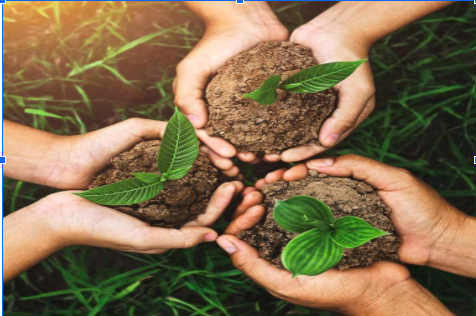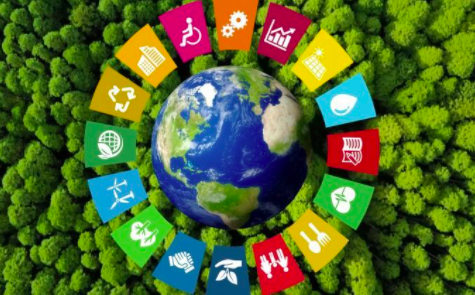Is climate change making the Sustainable Development Goals harder to attain?
Posted on : October 25, 2021Author : Ankita Chatterjee

It is known that we have hit a major bump on the road to sustainability. In today’s age, climate change poses the single biggest threat to sustainable development everywhere and its widespread, unprecedented impacts disproportionately burden the poorest and the most vulnerable. Endorsed unanimously by the United Nations member states in 2015, the Sustainable Development Goals (SDGs) provide a shared blueprint for peace and prosperity for people and the planet, now and into the future. At its core are the 17 internationally agreed-on goals which are intended to be met by the year 2030. These goals– which include climate action, zero hunger, and gender equality among others– are an urgent call for action by all countries, developed and developing, in a global partnership and are meant to improve life for people globally. The world has recognized that exterminating poverty and other deprivations must go hand-in-hand with strategies that improve health and education, reduce inequality, and spur economic growth, all while tackling climate change and working to preserve our oceans and forests. Climate change is acquiring a greater shape with every passing day with its grave repercussions felt in almost every aspect of life. The ever rising issue of climate change is already exerting serious strain on many goals of the SDGs, particularly on Goal 13 which calls for urgent action to combat climate change and its impacts. It is intrinsically linked to all 16 of the other Goals of the 2030 Agenda for Sustainable Development. Undoubtedly, climate change is slowing down the efforts and the progress to achieve the SDGs.

Climate change is a threat multiplier. It is amplifying existing threats, exacerbating problems for the economy, environment and society. The current global temperature has already begun producing serious negative impacts on natural and human systems, seriously impeding progress toward some SDGs. To address this issue, some immediate actions have been agreed upon. Collectively, the three post-2015 agendas for action – the Paris Agreement, the 2030 Agenda for Sustainable Development and the Sendai Framework for Disaster Risk Reduction – provide the foundation for sustainable, low-carbon and resilient development under a changing climate.
To counter climate change, in 2015, countries adopted the Paris Agreement which is a landmark in the multilateral climate change process because, for the first time, a binding agreement brought all nations into a common cause to undertake ambitious efforts to combat climate change and adapt to its effects. An ambitious climate goal, the Paris Agreement’s main objective is limiting global warming to well below 2 degrees Celsius, preferably to 1.5 degree Celsius, compared to pre-industrial levels. Currently the global average temperature is 1 degree Celsius higher than the pre industrial level. Implementation of the Paris Agreement is essential for the achievement of the Sustainable Development Goals, and provides a roadmap for climate actions that will reduce emissions and build climate resilience. However, balancing the goals will be a challenge as the agreement helps achieve most SDGs but at the same time it creates a trade-off for some SDGs.
There is not a single country or continent which has remained untouched by climate change. It is seriously disrupting national economies and affecting lives, communities and countries. People are experiencing the significant impacts of the rapid changes in climate, which include changing weather patterns, rising sea level, and more extreme weather events. The greenhouse gas emissions from human activities are the main drivers of rise in climate change and the subsequent global warming. They are now at their highest levels in history. Without any timely action, the world’s average surface temperature is projected to continue to rise and is likely to surpass 3 degrees Celsius by this century.
Most regions are experiencing greater warming than ever before. But the warming is not uniform with some areas of the world expected to warm even more than the other areas. Four regions face disproportionately higher risks than others—the Arctic, small island regions, dryland regions, and the least developed countries. As a result, the poorest and most vulnerable people are being affected the most as usual. Climate change will significantly hamper Least Developed Countries’ (LDCs) ability to achieve the SDGs on poverty, hunger, health, water, growth, infrastructure, cities, marine resources and ecosystems and threatens to drag millions of people into grinding destitution. It may also decrease LDCs’ ability to meet goals on education, gender, energy, inequality, sustainable consumption and production, peace, and implementation. On top of all this, extreme climate change has already started making the combat against climate change tougher.
Now comes the emergence and rapid spread of the COVID-19 virus in 2020 which has caused us to face a global health, economic and humanitarian crisis like no other. The COVID-19 pandemic has disrupted efforts to achieve the 2030 Agenda for Sustainable Development. The global community finds itself in an unprecedented situation where parallel threats of health, economic and social crises left countries struggling to contain the pandemic. The pandemic threatens to reverse years of progress on poverty, hunger, health care and education. While the virus has impacted everyone, it is affecting the world’s poorest and the most vulnerable people the hardest. The deadly virus has affected every aspect of life except one – climate change. Apparently, climate change is the only thing COVID-19 has not been able to touch. Global warming continues its progress despite the world-wide lockdowns of countries and their respective economies. Though there was a brief dip in pollution in all countries battling COVID-19 due to this, global carbon dioxide levels reached a record high again in 2020. In this regard, the pandemic has also shown that we are further from achieving the SDGs in terms of the fight against climate change.
However, at the same time, it also needs to be acknowledged that the sharp reduction in harmful emissions that occurred briefly during the pandemic, is clear evidence that there are indeed sustainable alternatives. Hence, it is now widely accepted that governments do have a vital role to play in ensuring a green, sustainable and inclusive recovery. That is why, the recovery after COVID-19 must be moulded into the opportunity to change the course of the Earth towards a greener future and to increase efforts to achieve the goals set in the 2030 Agenda.
The Sustainable Development Goals (SDGs) define the world we want. They apply to all nations and mean to ensure that no one is left behind whereas climate change vehemently threatens to derail what little has been achieved of all the 17 SDGs. The current warming is already having large impacts on ecosystems, human health and agriculture. As a result, reaching goals to eradicate poverty and hunger, and to protect life on land have become more challenging.
Climate change and the subsequent global warming is not just a long-term issue. It is happening today, and it entails uncertainties for policy makers trying to shape the future. Urgent action to halt climate change and deal with its impacts is, therefore, integral to successfully achieving all SDGs. Collective efforts are needed at all levels, reflecting different circumstances and capabilities, to limit global warming to 1.5C, taking into account equity and effectiveness, so that the global response to climate change is strengthened, and thereby, achieve sustainable development as targeted by the UN member states. The result will be a cleaner, sustainable, more productive, and stronger global economy.
–
References
1] “Action on Climate and SDGs”, UNFCCC
https://unfccc.int/topics/action-on-climate-and-sdgs/action-on-climate-and-sdgs
2] Stewart M. Patrick, “Climate Change Is Putting the SDGs Further Out of Reach”, council on foreign relations, August 23, 2021.
https://www.cfr.org/blog/climate-change-putting-sdgs-further-out-reach
3] “Climate Action and Sustainable Development are Inseparable”, SDG Knowledge Hub, 23 July 2019.
4] “Climate Change Is a Challenge For Sustainable Development”, World Bank, January 15, 2014.
5] “The Paris Agreement”, UNFCCC
https://unfccc.int/process-and-meetings/the-paris-agreement/the-paris-agreementNFCC
6] Helena Wright,”Will climate change render the SDGs impossible?”,iied, 19 June 2015.
https://www.iied.org/will-climate-change-render-sdgs-impossible
Ankita Chatterjee
Intern, Asia in Global Affairs





Leave a Reply